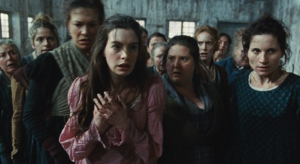Over the years, we’ve seen both books and plays get turned into movies, some done successfully, and some done not so successfully. However, what’s extremely rare is to see a play and a book get turned into a thrilling, beautiful movie with little to no flaws. “Les Mis” did just that.

It’s no secret that “Les Mis” was the first ever musical movie to be sung live — a risk that undoubtedly paid off. But, as successful as that was, I believe that “Les Mis” is Oscar worthy for reasons beyond that — it incorporated aspects of both the musical and the book in a way that no other musical movie has done before.
“Les Misérables,” written by Victor Hugo in 1862, consists of 1,463 pages. Certainly, it was no easy task to turn a novel of that length into a two and a half hour opera. And, although I hold the belief that “Les Mis” is the greatest musical production ever written, there were some vital parts of the book that had to be cut.
Although “Les Misérables” the movie cut out parts of the musical, another risk made by director Tom Hooper, it made up for it in relevant parts of the book that were brought to life through the movie.
Early on in both the musical and the book, Jean Valjean, the noble character and escaped convict, demonstrates his immense strength by lifting a collapsed cart, which saves a man’s life. Later on in the novel, when Valjean is forced to escape devoted policeman Javert, Valjean and Cosette seek shelter at a convent where Fauchelevent, the man who Valjean saved from the cart, works as the gardener. Without Fauchelevent, however, a man such as Valjean would not have been permitted to live in a convent.
The musical, on the other hand, cuts the convent out completely, leaving confusion as to how Valjean and Cosette safely escaped from Javert and essentially “disappeared” from the law. The movie, however, incorporates this aspect into the storyline, thus closing that crucial gap.
However, the significant aspect of both the musical and the book, which is often overlooked, is the importance of the bishop. It is, in fact, the bishop who tells Valjean “to become an honest man,” thus completely changing the course of the escaped convict’s life.
In the end of the movie, but not in the end of the musical, the bishop comes back when Valjean dies and goes to heaven, which brought me to tears (and I’m definitely not one to cry during movies).
In addition, they simple could not have cast a better man to play the bishop in the movie than the one and only Colm Wilkinson, the Valjean in the 1985 London production and whom the part was originally written for.
When Wilkinson was cast as Valjean, he simply responded, “My life has come full circle,” emphasizing the importance of the character. (This response also brought me to tears.)
Other aspects of the musical were changed as well. Some parts were cut, some parts were added, and some scenes and songs were moved around — and they were all done extremely successfully.
The acting was impeccable, risks were taken, and the true meaning of both the book and the novel was flawlessly conveyed. “Les Misérables” is certainly deserving of an Oscar for Best Picture of the year.






